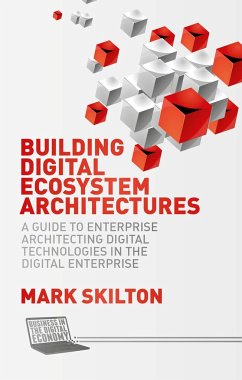The design of digital solutions has become a pressing concern for practitioners faced with a plethora of technology impacting their business. From cloud computing to social networks, mobile computing and big data, to the emerging of Internet of things, all of which are changing how enterprise products, services, rooms and buildings are connected to the wider ecosystem of networks and services. This book defines digital ecosystems with examples from real industry cases and explores how enterprise architecture is evolving to enable physical and virtual, social, and material object collaboration and experience.
The key topics covered include:
Concepts of digitization
Types of technological ecosystems
Architecting digital workspaces
Principles of architecture design
Examples architecting digital business models
Examples of digital design patterns
Methods of monetization
Conclusions
The key topics covered include:
Concepts of digitization
Types of technological ecosystems
Architecting digital workspaces
Principles of architecture design
Examples architecting digital business models
Examples of digital design patterns
Methods of monetization
Conclusions
Market:
IT practitioners who are seeking real examples of design and implementation architecture best practice that enables disruptive technology;
Business leaders and planners in marketing, sales, finance, purchasing, logistics and other functions that are looking for ways to leverage digital technologies to create customer sales growth, impact and productivity improvements;
From small start-up businesses to large existing multi-national companies who both need to understand how to define consumer value in the digital enterprise for realistic payback and monetization;
Business and IT governance, risk and compliance policy makers seeking an understanding of how digital technologies change exposure to data, transactions and environment security responsibilities and the assurance and reliability of service performance
IT practitioners who are seeking real examples of design and implementation architecture best practice that enables disruptive technology;
Business leaders and planners in marketing, sales, finance, purchasing, logistics and other functions that are looking for ways to leverage digital technologies to create customer sales growth, impact and productivity improvements;
From small start-up businesses to large existing multi-national companies who both need to understand how to define consumer value in the digital enterprise for realistic payback and monetization;
Business and IT governance, risk and compliance policy makers seeking an understanding of how digital technologies change exposure to data, transactions and environment security responsibilities and the assurance and reliability of service performance








